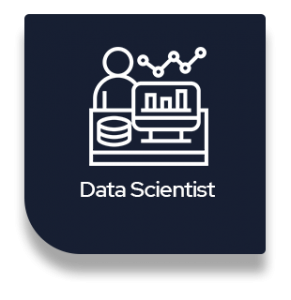Becoming an Artificial Intelligence Engineer, AIE – learn all about what an Artificial Intelligence Engineer does and how to get into this exciting career field.
What is AI Engineering?
Artificial Intelligence Engineers use AI and machine learning techniques to develop applications and systems to help organizations increase efficiency, cut costs, increase profits, and make better business decisions.
AI engineering focuses on developing the tools, systems, and processes that enable artificial intelligence to be applied in the real world. Any application where machines mimic human functions, such as solving problems and learning, can be considered artificial intelligence. Algorithms are “trained” by data, which helps them to learn and perform better.
You may have encountered the results of AI engineering when you use Netflix, Spotify, or YouTube, where machine learning customized suggestions based on your behavior. Another popular example is transportation, where AI and machine learning technology drive self-driving cars. It’s instrumental in healthcare because AI can power robots to perform surgery and generate automated image diagnoses.
AI Engineer Responsibilities
AI engineers play an essential role in organizations that use AI. They chart the AI strategy and define the problems to be solved with AI. In addition, they’re in charge of building AI development and production infrastructure and then implementing them. Here are some specific tasks and responsibilities of an AI engineer:
- Create and manage the AI development and production infrastructure.
- Conduct statistical analysis and interpret the results to guide and optimize the organization’s decision-making process.
- Automate AI infrastructures for the data science team
- Build AI models from scratch and help product managers and other stakeholders with analysis and implementation
- Transform machine learning models into APIs that can be integrated with other applications
- Collaborate across teams to help with AI adoption and best practices
Salary and Job Outlook
AI engineering is a specialized field that has promising job growth and tends to pay well.
According to Glassdoor, the median base salary for an AI engineer is $101,991 in the United States. Falling under the categories of Computer and Information Research Scientist, AI engineers have a median salary of $131,490, according to the US Bureau of Labor Statistics.
There is a projected job growth of 22 percent between 2020 and 2030, which is much faster than the average for all occupations (8 percent).
AI engineers typically work for companies like Google, IBM, and Meta, helping them improve their products, software, operations, and delivery. But, more and more, they may also be employed in government and research facilities that work to improve public services.
Hiring growth for artificial intelligence specialists, including engineers, has grown 74 percent annually for the past four years, according to LinkedIn’s 2020 Emerging Jobs report.
How to Become an AI Engineer, AIE
Becoming an AI engineer requires basic computer, information technology (IT), and math skills, which are critical to maneuvering artificial intelligence programs. Here’s how you can get started in AI engineering.
Learn the skills needed.
You’ll need to build your technical skills, including knowledge of the tools that AI engineers typically use.
- Programming: You’ll want to learn programming languages such as Python, R, Java, and C++ so you can build and implement models.
- Probability, statistics, and linear algebra: These are needed to implement different AI and machine learning models.
- Big data technologies: AI engineers work with large amounts of data, so you’ll be required to know Apache Spark, Hadoop, and MongoDB to manage it all.
- Algorithms and frameworks: You’ll want to understand machine learning algorithms such as linear regression and Naive Bayes, as well as deep learning algorithms such as recurrent neural networks and generative adversarial networks, and be able to implement them with a framework. Common AI frameworks include Theano, TensorFlow, Caffe, Keras, and PyTorch.
You can learn these skills through online courses or boot camps designed to help you launch your career in artificial intelligence.
Apply for jobs.
Applying for a job can be intimidating when you have little to no experience in a field. But it might be helpful to know that people get hired daily for jobs without experience. There are many ways to enhance your resume for success in the job search. For AI engineering jobs, you’ll want to highlight specific projects you’ve worked on for jobs or classes that demonstrate your broad understanding of AI engineering.
Once you’ve applied for jobs, you’ll hopefully get an interview. However, don’t be discouraged if you apply for dozens of jobs and don’t hear back – data science, in general, is such an in-demand (and lucrative) career field that companies can receive hundreds of applications for one job.
Preparing for the interview requires practice and preparation, especially for tech jobs like AI engineer. You’ll want to improve your interview skills to prove to hiring managers that you’re perfect for the job. In addition, you’ll be expected to explain your reasoning for developing, deploying, and scaling specific algorithms. These interviews can get very technical, so be sure you can demonstrate how you solved a problem and why you chose to solve it that way.
Get work experience.
There may be several rounds of interviews, even for an entry-level position or internship. But if you land a job, it’s time to prove yourself and learn as much as possible. Then, you’ll be able to apply the skills you learned toward delivering business insights and solutions that can change people’s lives, whether in health care, entertainment, transportation, or consumer product manufacturing.
Explore artificial intelligence with Skilldacity.
Launch your career as an AI Engineer with the AI Engineer professional courses offered by Skilldacity. You’ll learn to generate business insights from big data using machine learning techniques and gain essential skills to deploy algorithms with Apache Spark and models and neural networks with Keras, PyTorch, and TensorFlow.


